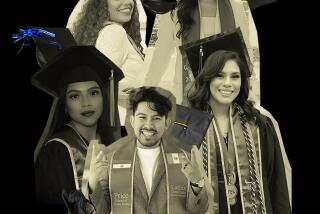OC HIGH: STUDENT NEWS & VIEWS : In College Interview, Questions Count, Too
- Share via
The campus interview is an important part of the application process at many colleges and universities. It gives colleges the chance to get to know prospective students and to see what special qualities they can bring to the campus.
Because an interview is part of the college’s screening process, almost everyone gets nervous beforehand. Do some advance work. If you go prepared with the right kinds of questions, you’ll not only be more relaxed, you’ll also walk away with inside information.
First, ask the admissions officer to explain the college’s philosophy or “mission.” What is the college preparing you for? Some schools, for example, are geared more toward professional education than the liberal arts. Others were founded by a religious organization and still carry those values into the curriculum. See how comfortable you are with those ideas and how they are expressed on campus.
Many colleges have a set of general education requirements. Others give students almost complete freedom in deciding their course of study. Find out what each college’s policy is and try to decide what’s best for you.
It makes sense to ask about academics early on. For example, what’s the mix between large lecture courses and smaller seminars? What if you have an interest that’s a bit out of the ordinary? Will you be able to pursue this interest through independent, guided study?
In college, a great deal of learning takes place out of the classroom. Are students encouraged to do their own research? Does the college have the facilities for this? Find out what kinds of libraries and other facilities are available for your use and how late they’re open.
If you’re studying computer science, you’ll want to be able to work with state-of-the-art technology. If you plan to pursue a language, ask about the language labs and the kind of equipment they include.
What about other hands-on learning experiences? Some colleges require students to take internships or participate in research projects. This is a good way to learn about different careers and get experience in the working world. See what kind of outreach and volunteer programs the college offers.
There are many other ways in which colleges encourage learning. You might ask about field trips, especially if you’re studying science, or about opportunities to attend cultural events.
Many colleges offer living-learning programs in residence halls. A dorm may be organized around a “theme”--anything from a foreign language to community service to health professions. Students who choose to live in these dorms are encouraged to organize and attend lectures or special events on the topic. At some colleges, every freshman dorm is assigned a theme for the year, which students explore in a variety of ways.
Your adviser will also be a key component of your educational experience. Ideally, an adviser should have time to really help you plan your academic program. Ask about how closely you’ll work with an adviser, and find out how easy it is to change advisers if your interests change.
Another important college experience is meeting and working with people from different cultures. How many international students are there on campus? Is there an international center where views are exchanged? What about study abroad? Will you have the chance to be an international student?
It’s a good idea to ask the admissions officer in-depth questions such as these. You’ll get the kind of information you need to make a sensible decision while showing the college that you’re interested and informed.
More to Read
Sign up for Essential California
The most important California stories and recommendations in your inbox every morning.
You may occasionally receive promotional content from the Los Angeles Times.













